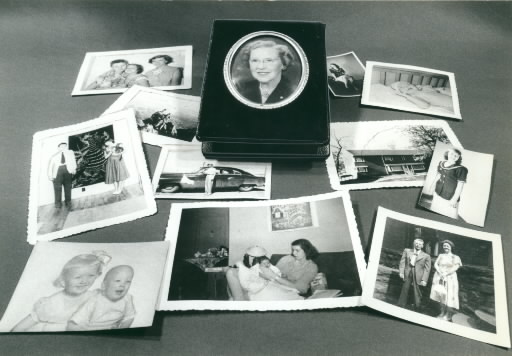The "Moral Adoption" of Hiroshima’s A-bomb Orphans, Part I [2]
Feb. 1, 2009
Letters exchanged between American citizens and Japanese children: Strong guilt and a desire to atone
by Akira Tashiro and Masami Nishimoto, Staff Reporters
“There was no option but to drop the atomic bombs.” This was, in the United States, the prevailing view of the atomic bombings. But what did people who became “moral parents” of A-bomb orphans, offering their support to these Japanese children, feel in their country dominated by this view? The letters written by these U.S. citizens to the children in the Hiroshima War Orphans Foster Home conveyed the strong guilt they felt as “perpetrators” and their desire to somehow atone for this deed.
“I’m really sorry that our government destroyed the city of Hiroshima and created many orphans like you. We don’t always have power to control what our government does. In any case, I’d be happy to help you.” [By a priest, on April 25, 1950]
A woman believed to be a German Jew, and a teacher’s wife who had just lost her only son wrote these messages to their Japanese children:
“My husband and I came to the United States as refugees from Hitler’s Germany. Not being very young any more we had quite a struggle to take root in a new country. My husband is teaching languages at a college in West Virginia, I am a librarian at another college in New York state. Still we feel that we can contribute our share to make up to those who suffered more severely than we did.” [On February 10, 1950]
“What we want most, is to be sure that there need not be another war and our caring for you is one way that we can express that hope.” [By a housewife, on June 12, 1950]
These American citizens detested war and wanted to provide moral support to children in Hiroshima who were victimized by the atomic bombing at a very young age. The idea of humanism, based on their Christian faith, and the strong wish for “No More Hiroshimas” lay deep in the heart of the people who volunteered to become moral parents. In some cases, groups of people joined together to serve as “a parent.”
“All of us in the club want to help so I guess you have 40 mothers, isn’t that strange? We sent you a package last week. The presents in the box are from your mothers. I wish that we were close enough so that we could see you and do more things for you.” [By the president of a women’s club, on December 11, 1950]
As more letters were exchanged, the children began to come out of their shells. A boy who was evacuated from the city prior to the bombing told his new father about “that day.”
“At about 8 o’clock that morning, the sky suddenly grew dark over Hiroshima and many people came fleeing to the village where I was staying. I was worried about my mother, but she didn’t come. After our evacuation was called off, I continued to wait for her, but she never came. And I never saw her again.” [By a third-year student in junior high school, on April 11, 1951]
These children wrote about their lives at school and at the Hiroshima War Orphans Foster Home with happiness and expressed their gratitude to their moral parents for the clothes, food, and financial assistance they sent from the affluent nation abroad. Between the lines of a letter written by a 14-year-old girl can be sensed the admiration and attachment she developed for her “parents”, whom she had not met in person.
“I always look forward to receiving letters from you, my mother and father. I enjoy the chocolates and sweets, too. I read your letters when I feel lonely or before I go to bed. The warm letters from my mother are like a gentle embrace. They make me very happy.” [By a second-year student in junior high school, on January 19, 1951]
Keywords
No More Hiroshimas
The campaign for “No More Hiroshimas” began in 1948, proposed mainly by the U.S. Baptist Church. The campaign called on the world to make August 6 a day of peace for the world. The idea of “No More Hiroshimas” was used as the slogan of the Hiroshima Peace Festival Ceremony in 1948.
(Originally published on July 14, 1988)








